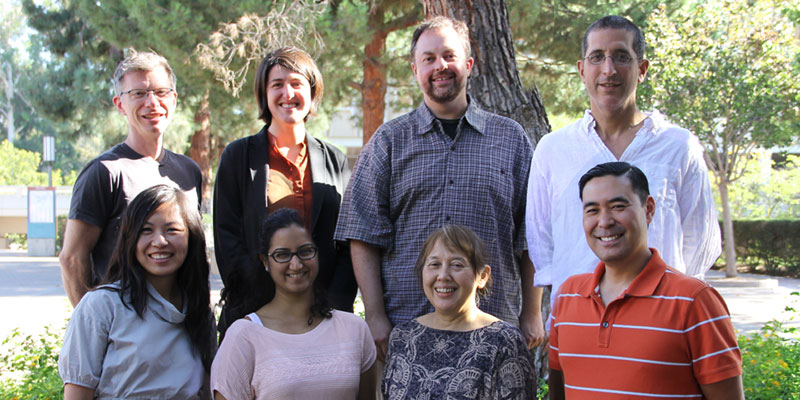For the past two years, the University of California Research Institute has hosted and supported working groups, residential research groups, global workshops, graduate seminars, and conferences all focused on a central theme: “The Humanities and Changing Conceptions of Work.” As we enter the third and final year of this multicampus research initiative, the UCHRI is pleased to host the final HCCW working group, which is a hybrid working/residential research group. Convened by John Marx, Professor of English at UC Davis, “The Work of Humanities / The Humanities as Work” group met officially for the first time from October 14 to 18 for a weeklong intensive session. The group will meet in residence monthly throughout the Fall quarter while continuing to collaborate for the full year through a variety of digital platforms.
The group’s makeup is extremely diverse, appropriately reflecting the many scholars, approaches, and topics that have already come together under The Humanities and Changing Conceptions of Work Initiative. As Prof. Marx observes, “we are a truly representative bunch, including scholars from every rank (graduate to full professor) working in departments that range from the social science wing of the humanities to the most stereotypically humanist fields of literary study.” Almost every UC campus is represented and the participants hail from a wide array of departments including Communications, Film and Media Studies, South and Southeast Asian Studies, Gender Studies, Comparative Literature, and the interdisciplinary History of Consciousness program. This interdisciplinarity is important to the working group’s process, as John Marx explains: “Our differences remain before the group pretty consistently, and the things that bind us become that much more important as a result.”
Organizer John Marx is no stranger to interdisciplinary collaboration. In a forthcoming project, tentatively titled “Mass Media and the Humanities Workforce,” Marx collaborates with Film and Media scholar Mark Cooper, and according to their website, “any interested parties they happen to encounter.” However, Prof. Marx says, leading such an interdisciplinary group is a “work in progress.” In fact, he asserts “the group is at its best when a number of people want to drive; when I’m not the one doing the prodding and provoking.” He described a particularly successful session wherein “one person proposed an exercise to get us talking about our project, and as we did so another was taking notes on the white board, and a third was generating a shared record on a google doc. This was exciting.”
Of course, this collaborative mode is not just the form of the hybrid group, but also a major feature of what Prof. Marx hopes will be its output. He describes the group’s final product as “pretty targeted on humanists interested in doing collaborative work, maybe for the first time.” Both in terms of the group’s collaboration and its recommendations for other humanists Prof. Marx hopes to “question the fiction of individual scholarship” and “recognize that even when we work alone, our mediated participation with other scholars and readers suggests we’re engaged in a kind of collaboration.” Ultimately, this working group will provide a model and a method for a future in the humanities where “collaborative work is more rule than exception.”

Photo (top-left to bottom-right): Convener John Marx (English, UC Davis), Lilly Irani (Communications, UC San Diego), Adam Hefty (History of Consciousness, UC Santa Cruz), Jeffrey Sacks (Comparative Literature, UC Riverside), Amy Lee (English, UC Berkeley), Preeti Sharma (Gender Studies, UCLA), Sylvia Tiwon (South & Southeast Asian Studies, UC Berkeley), Glen Mimura (Film and Media Studies, UC Irvine)
